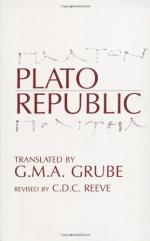|
This section contains 2,595 words (approx. 9 pages at 300 words per page) |

|
Plato's Concept of Philosopher-kings
Summary: Plato wrote that "Society originates because the individual is not self-sufficient and no two of us is born exactly alike." These two assumptions are the basis for Plato's ideal society, in which different persons specialize in different skills. Plato proposed that philosophers are the right candidates to assume the responsibility of ruling the society, for he assumes only the philosophers have the wherewithal to perceive and work toward the society's common good while avoiding influence from worldly desires in the process. But are Plato's assumptions and proposals in this regard truly feasible?
"Society originates because the individual is not self-sufficient and no two of us is born exactly alike." How do those two assumptions/principles lead to Plato's ideal society being ruled by philosophers? Are you convinced by his claim that Philosophers should rule"
A good starting point will be to consider what Plato means by these two assumptions. The first assumption states that the individual not self-sufficient (369b). This is the basis by which cities form; communities of human beings are created because every man has needs that he cannot cater for by his own means, which ensues in the association of the needy. Plato believes that humans are social beings, or natural cooperators.
The second assumption states that "no two are born exactly alike (370a-b)." This explains why the cities formed are heterogeneous rather than homogeneous. Each person has a different aptitude which ascribes each to a different...
|
This section contains 2,595 words (approx. 9 pages at 300 words per page) |

|


